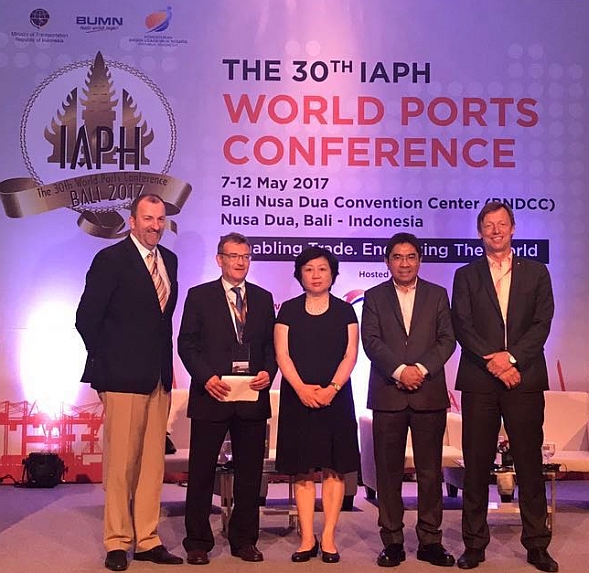BALI- INDONESIA-MAY 2017
INSTITUTE LEADS PANEL ON PORT COLLABORATION AT IAPH 2017
Kieran Ring CEO of the Global Institute of Logistics Debated Current Thinking on Collaboration Amongst Ports With Port Leaders at the International Association of Ports and Harbours World Conference in Bali.
The key takeaway from the session was that port authorities who embraced their new found role as ‘honest and trusted brokers’ in the global maritime supply chain process, particularly in the area of data mining and sharing could add significant value to the supply chain process.
The 30th IAPH World Ports Conference convened in Bali Nusa Dua, Indonesia, May 7-12, 2017, under the theme of “Enabling Trade, Energizing The World”, was a great success, attracting more than 650 delegates, accompanying persons, guest speakers, sponsors and exhibitors from 50 countries in the world.
The Institute was invited to debate the issue of collaboration as part of best practice in port management. The title of the panel was ‘Collaboration Opportunities To Strengthen Cooperation And Sustainability Among Ports‘ The subject was discussed from a variety of perspectives, firstly what collaboration meant from an international perspective and in particular how concepts like chainPORT were adding value to the supply chain process. Secondly, regionally on how chainPORT logic is applied in the context of regional port systems and in this case the Indonesian port system was the case study debated.

PICTURED FROM RIGHT TO LEFT ARE: Kieran Ring CEO GIL, Santiago Garcia-Mila, IAPH President, Deputy Executive Director At Port Of Barcelona, Madam Yue Yuan, Deputy Director General Of Guangzhou Port Authority, Elvyn G. Masassya, CEO Of Indonesia Port Corporation II and Tino Klemm CFO Of Hamburg Port Authority.
Elvyn G. Masassya, CEO Of Indonesia Port Corporation II opened the session with his presentation, ‘Collaboration Opportunities To Strengthen Cooperation And Sustainability Among Ports – From Indonesia’s Port Perspective, this was followed by a presentation from Tino Klemm CFO Of Hamburg Port Authority on ‘Revisiting The Role Of Ports In A Digital Supply Chain Through Cooperation And Collaboration’, Santiago Garcia-Mila, IAPH President, Deputy Executive Director At Port Of Barcelona followed Hamburg and the session was closed by Madam Yue Yuan, Deputy Director General Of Guangzhou Port Authority who presented on, ‘Exploring A New Model Of Cooperation For Mutual Benefits’
The presentations were followed by a lively debate on the evolving role of the port authority as the actor in global maritime logistics chain who enjoys the status of ‘honest and trusted broker’ Delegates and speakers debated how this status could be leveraged to drive collaboration both locally and globally. The overriding takeaway from the session was that port authorities who embraced their new found role and complemented this development with the deployment of ‘smart’ tools as part of a broad digitization strategy would succeed and in so doing add significant value to the supply chain process.
NOTES TO EDITORS
ABOUT INTERNATIONAL ASSOCIATION OF PORTS AND HARBOURS:
Founded in 1955, the International Association of Ports and Harbors (IAPH) is a non-profit global alliance of roughly 180 ports and 150 maritime companies and institutes representing about 90 countries. The IAPH is dedicated to fostering cooperation among ports and harbors and promoting the vital role they play in creating a peaceful, more prosperous world.
Based in Tokyo and recognized as the only voice speaking for ports around the globe, the IAPH has Consultative NGO Status from the United Nations and is active in developing international trade and maritime policy.
IAPH member ports handle about 80 percent of world container traffic and more than 60 percent of all international maritime trade.
ABOUT GLOBAL INSTITUTE OF LOGISTICS
The Global Institute of Logistics (GIL) was established in 2003 under the Chairmanship of renowned US logistician and author Robert V. Delaney in response to the global logistics industry’s call for “joined up thinking” amongst stakeholders in the global supply chain. GIL looks to resolve the challenges facing the global logistics chain of managing single transport modes, modal systems, and targets which are set on stand-alone operations to create a seamless global logistics system.
Acting as a think tank within the sector, GIL brings together thought-leaders and thought-followers as part of a global knowledge network committed to building up the information base, best practices and standards needed. This, in turn, creates a platform through which knowledge is shared, best practice is adopted and trade developed. Today the Institute is a community of organizations and professionals from across the world that share a commitment to collaborating on global logistics solutions.
The Institute’s mission is to ‘Network the Global Logistics Community’
For further information, visit www.globeinst.org
For further information,
Contact the Institute’s Media Director:
mediadirector@globeinst.org
GIL NETWORKING THE GLOBAL LOGISTICS COMMUNITY

